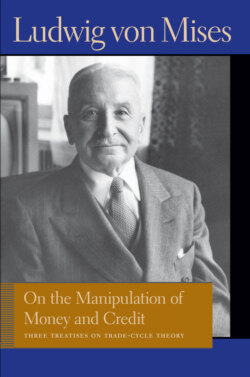Читать книгу On the Manipulation of Money and Credit - Людвиг фон Мизес - Страница 12
На сайте Литреса книга снята с продажи.
3. Effect on Interest Rates
ОглавлениеObviously, this shortage of monetary units should not be confused with what the businessman usually understands by a scarcity of money, accompanied by an increase in the interest rate for short-term investments. An inflation, whose end is not in sight, brings that about also. The old fallacy—long since refuted by David Hume and Adam Smith—to the effect that a scarcity of money, as defined in the businessman’s terminology, may be alleviated by increasing the quantity of money in circulation, is still shared by many people. Thus, one continues to hear astonishment expressed at the fact that a scarcity of money prevails in spite of the uninterrupted increase in the number of notes in circulation. However, the interest rate is then rising, not in spite of, but precisely on account of, the inflation.
If a halt to the inflation is not anticipated, the money lender must take into consideration the fact that, when the borrower ultimately repays the sum of money borrowed, it will then represent less purchasing power than originally lent out. If the money lender had not granted credit but instead had used his money himself to buy commodities, stocks, or foreign exchange, he would have fared better. In that case, he would have either avoided loss altogether or suffered a lower loss. If he lends his money, it is the borrower who comes out well. If the borrower buys commodities with the borrowed money and sells them later, he has a surplus after repaying the borrowed sum. The credit transaction yields him a profit, a real profit, not an illusory, inflationary profit. Thus, it is easy to understand that, as long as the continuation of monetary depreciation is expected, the money lender demands, and the borrower is ready to pay, higher interest rates. Where trade or legal practices are antagonistic to an increase in the interest rate, the making of credit transactions is severely hampered. This explains the decline in savings among those groups of people for whom capital accumulation is possible only in the form of money deposits at banking institutions or through the purchase of securities at fixed interest rates.
